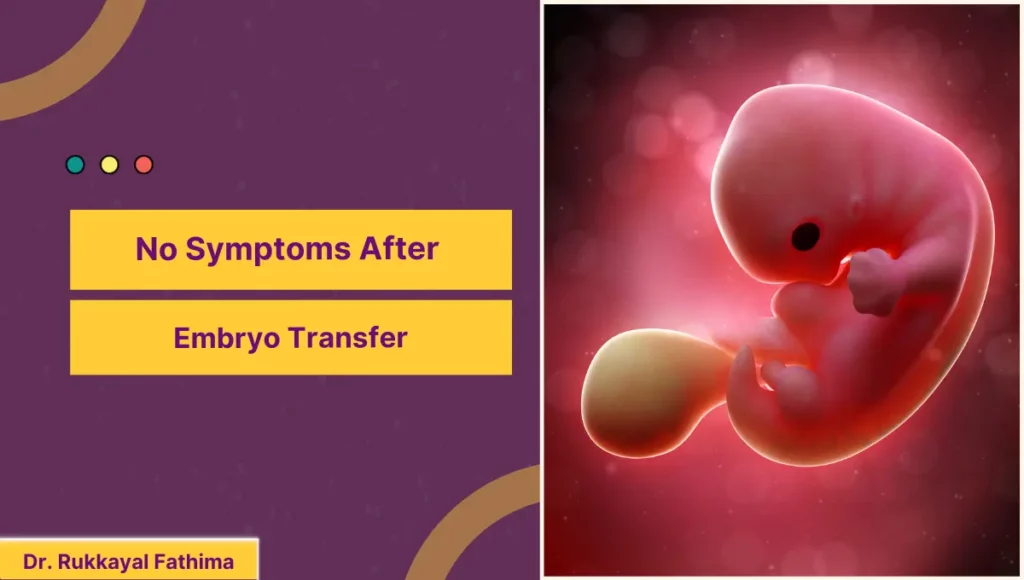IVF (Invitro Fertilization) is a fertility treatment many couples undergo when they have fertility issues and can’t get pregnant naturally. It involves collecting the eggs and sperm from the couple and fertilizing them in a laboratory.
The developed embryos are transferred into the woman’s uterus during the embryo transfer procedure. Many people believe that IVF is difficult, and they can be stress-free after the process.
However, only the couples undergoing the procedure will know that the time after the embryo transfer is the most crucial and anxious period in the treatment.
The two-week wait and betrayal you feel after having no pregnancy symptoms can be depressing for people. In this article, let’s discuss whether having no symptoms after embryo transfer is normal. We will also look into the symptoms you can look for after the procedure.
Is it normal to have no symptoms after the embryo transfer?
Yes, it is absolutely normal to have no symptoms after embryo transfer. Generally, you will start having pregnancy symptoms about 2 weeks (10–14 days) after embryo transfer. Some women might not feel any symptoms.
The simple reason for this is that every woman’s body is different. So, everyone experiences pregnancy symptoms differently. While some women may experience several symptoms, some women might not have any and feel completely normal.
This is completely normal and does not affect the pregnancy results. Your symptoms might be affected by some factors, like the ones below.
- Your hormone levels (due to the progesterone in your fertility medications)
- The quality of the transferred embryo (the embryo may take some time to implant in the uterus)
- Your body’s reaction to the implantation process.
So, don’t worry if you don’t experience any symptoms after embryo transfer. Here are some things you can do to check your pregnancy if you experience no symptoms.
1. Take a pregnancy test.
Doctors usually suggest you wait two weeks after embryo transfer to take a pregnancy test. This gives embryos time to implant and develop in the uterus. You will likely know if you are pregnant after taking a pregnancy test.
- What if the pregnancy test turns out negative? There are only three reasons your pregnancy test is negative.
- The embryo failed to implant, and the IVF cycle failed.
- The embryo hasn’t been implanted fully in the uterus.
- Your body needs time to realize the pregnancy and release pregnancy hormones (hCG).
2. Visit your IVF doctor.
If you encounter any of the above cases, you can visit your IVF doctor and get tested for pregnancy. Your doctor will take blood tests and ultrasound scans to confirm your pregnancy. This can help you find whether the absence of symptoms means a failed pregnancy.
What are the Symptoms After an Embryo Transfer
So far, we have seen what to do if you don’t experience any pregnancy symptoms. But what are those symptoms? You should first learn what symptoms you will experience to look out for them after embryo transfer.
Below are some symptoms you will experience after an embryo transfer.
Bleeding
It is normal to experience some light bleeding or spotting some days after embryo transfer. This happens when the embryo implants into the uterine lining. So, you don’t have to be afraid if you see some bleeding in your vaginal areas.
Breast Pain
You might also feel some breast pain and tender breasts. This is mainly due to the hormonal changes due to IVF. It can also happen because your breasts are changing to facilitate lactation.
Remember that your fertility medications (progesterone) can also cause breast pain. So, it doesn’t always mean you are pregnant.
Cramping
Some women may also experience cramping after embryo transfer. Like bleeding, cramping is also a sign of implantation. However, progesterone can also cause cramping. So, it doesn’t signify pregnancy.
Tiredness
Fatigue and tiredness are common in both natural and IVF pregnancies. Women who undergo IVF might feel more tired due to the fertility medications and stress they undergo during the procedure. Again, this is not a surefire sign of pregnancy.
Headaches
Headaches are mainly due to the hormonal changes that occur in your body. The fertility medications you take to induce ovulation can alter your hormone levels and cause headaches. Again, headaches do not mean pregnancy.
Conclusion
Whether you experience the symptoms we discussed above or not, it is best to wait two weeks and visit your IVF doctor for a pregnancy test. Home pregnancy tests are a good choice, but they do not always give accurate results. So, it is best to undergo a blood test or ultrasound scan to confirm pregnancy.
You will start experiencing pregnancy symptoms about two weeks after embryo transfer. This time may vary depending on when the embryo can implant into the uterus.
Generally, you will experience tender breasts and slight stomach cramps during implantation. If you haven’t noticed these symptoms in the weeks following your embryo transfer, it could mean that the implantation failed. You may also have vaginal bleeding as a sign of failed implantation.
Generally, you will experience tender breasts and slight stomach cramps during implantation. If you haven’t noticed these symptoms in the weeks following your embryo transfer, it could mean that the implantation failed. You may also have vaginal bleeding as a sign of failed implantation.
The first symptom you may experience after implantation is implantation bleeding. It is a light bleeding or spotting you will notice after embryo transfer. It usually indicates successful implantation.





